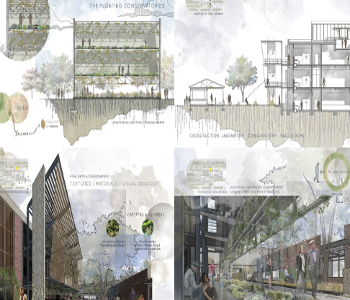Latest News Archive
Please select Category, Year, and then Month to display items
06 April 2018
Photo Rulanzen Martin
 From the left: Dr Thulisile Mphambukeli, leader of the BRICS research team that is exploring the political economy of water and food security, and her research partner, Dr Victor Okorie.
From the left: Dr Thulisile Mphambukeli, leader of the BRICS research team that is exploring the political economy of water and food security, and her research partner, Dr Victor Okorie.
A Brazil, Russia, India, China and South Africa (BRICS) delegation is to hold the 10th Annual BRICS Summit in the last week of May 2018 in Johannesburg. Dr Thulisile Mphambukeli, leader of the University of the Free State (UFS) research team alongside Dr Victor Okorie from the Department of Urban and Regional Planning, in collaboration with Prof Lere Amusan of North-West University, will ensure that water and food security is a prominent feature on the gathering’s agenda.
First, the project titled: “Exploring the political economy of water and food security nexus in BRICS and Africa” will debut at the National Institute for the Humanities and Social Sciences BRICS Think Tank Forum”.
According to Dr Mphambukeli, the key to water security is attitudinal change by means of education and conscientisation. This, she is adamant about, holds the potential to drive behavioural adjustments in the way society interacts with water.
Genetic and social approaches
Dr Okorie asserts that if strides towards reducing the demand for water were to be made, research efforts should be geared towards effecting changes at DNA level. Meaning we need to explore waterwise ways that enable crops and animals to thrive optimally.
The project also looks at social dimensions of water such as flushing a toilet. “Research activities on redesigning toilets, especially the urinal, where more than nine litres of water are used to flush less than one cubic centimetre of urine, are timely in the context of managing water and the food nexus crises,” said Dr Okorie.
Combining the genetic and social approaches would allow us to produce more with a smaller water footprint. This can be made possible by implementing precision agriculture which is about estimating and applying exact quantities of water and nutrients needed for the production of crops or the raising of livestock.
Paradigm shifting policies
Prof Amusan said the team intended to propose functional solutions that take the quality of water into consideration. Equitable production and distribution of water depends on endorsing policies of co-production between citizens, governments and the public sector. BRICS member states mutually consider water and food security as an issue of paramount significance, hence its feature on this prestigious summit’s agenda.
Department of Architecture receives unconditional validation
2017-08-30

In the 2017 validation portfolio was the
dissertation: Revealing the Invisible
by Laura-Anne Fox. Photo: Supplied
Earlier this year the Department of Architecture at the University of the Free State (UFS) received unconditional validation nationally from the South African Council for the Architectural Profession (SACAP) and internationally from the Commonwealth Association of Architects (CAA). SACAP aspires towards people-centred architecture for South Africa.
Register as professionals in the industry
The broad aim of the validation session is to safeguard standards in architectural education and for professional registration.
Accordingd to Jako Olivier, Programme Director of the Department of Architecture at UFS, unconditional validation sanctions that the three professional oriented degrees are aligned with national and international education standards. The degrees, BArch, BArch Hons and MArch (Professional), then also meet the prescribed national standards of registration compatible with international standards.
Department proud of calibre students
The validation is effective for five years; from 2017 to 2022.
The department is proud of the calibre of students they guide towards employment in the architectural field. Graduates from the department find employment at leading architectural firms nationally and internationally.